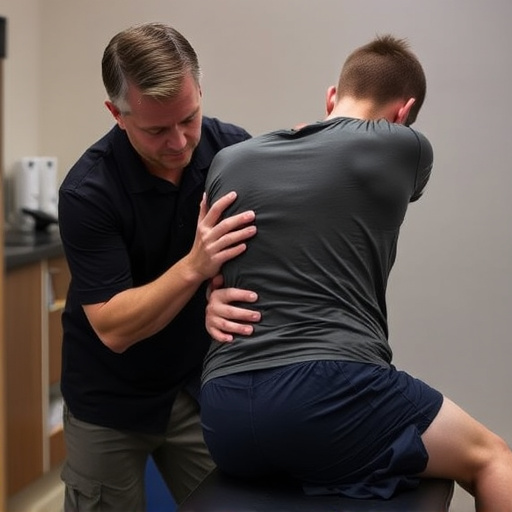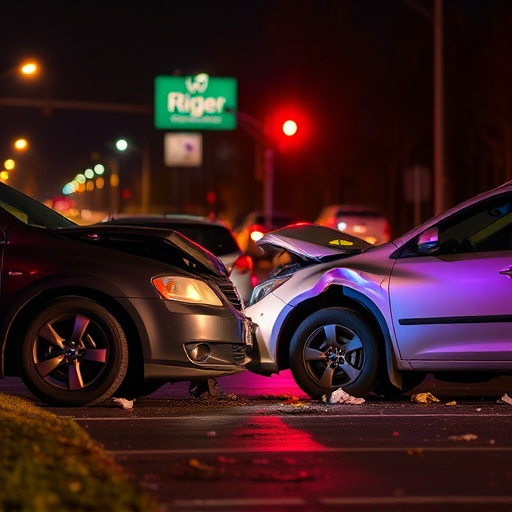Accident injury specialists are healthcare experts who specialize in diagnosing and treating injuries from accidents like car crashes or workplace incidents, including fractures, sprains, whiplash, and traumatic brain injuries. They collaborate with other providers for comprehensive patient care and create individualized treatment plans incorporating physical therapy to ensure full functional recovery. Primary doctors initially assess health concerns, managing minor issues but referring patients to specialists like accident injury specialists for complex or severe injuries. Choosing the right specialist is crucial for optimal recovery, as they offer advanced techniques for conditions like severe muscle recovery.
When it comes to managing accident-related injuries, knowing the distinction between an Accident Injury Specialist and a Primary Doctor is crucial for optimal healthcare. While a Primary Doctor provides general care and diagnosis, an Accident Injury Specialist offers specialized expertise in treating trauma and chronic pain often associated with accidents. Understanding their roles can help individuals make informed decisions, ensuring they receive the best possible care for their specific needs. This article delves into these specialties, highlighting key differences to guide your choice.
- Understanding Accident Injury Specialists: Their Role and Expertise
- The Primary Doctor's Scope: General Care and Diagnosis
- Key Differences: When to Choose Each for Optimal Healthcare
Understanding Accident Injury Specialists: Their Role and Expertise

Accident injury specialists are healthcare professionals who focus on the diagnosis, treatment, and management of injuries resulting from accidents, such as car crashes, falls, or workplace incidents. Their expertise lies in understanding the complex interplay between physical trauma and the human body. These specialists are trained to assess a wide range of injuries, including but not limited to fractures, sprains, whiplash, and traumatic brain injuries. They often work collaboratively with other healthcare providers to ensure comprehensive auto accident recovery and wellness care for their patients.
Beyond immediate post-injury care, accident injury specialists play a crucial role in facilitating the transition to long-term post-injury care. This involves developing individualized treatment plans that cater to each patient’s unique needs, incorporating physical therapy, rehabilitation, and other interventions to optimize recovery outcomes. Their holistic approach ensures patients receive not just the necessary medical attention but also the support required for a full and functional return to their daily lives.
The Primary Doctor's Scope: General Care and Diagnosis

A primary doctor, often your first point of contact during a health concern, plays a pivotal role in general healthcare and well-being. Their scope includes diagnosing and treating a wide range of common medical conditions, from minor ailments to chronic diseases. They manage patient care across various age groups, providing preventive measures, routine check-ups, immunizations, and basic treatments for conditions like cold, flu, or mild injuries. These doctors are trained to recognize when a patient needs further specialized care and can refer individuals to the appropriate specialists, including accident injury specialists, for more complex issues.
While primary doctors offer comprehensive general care, their expertise lies in identifying and addressing everyday health problems. They often prescribe therapeutic exercises or recommend treatments like shockwave therapy for certain conditions, but for severe or specific injuries, such as those sustained in auto accidents, consulting an accident injury specialist is essential to ensure proper recovery and rehabilitation.
Key Differences: When to Choose Each for Optimal Healthcare

When it comes to optimal healthcare for accident-related injuries, choosing the right medical professional is crucial. An accident injury specialist is a specialist in managing and treating conditions arising from accidents, such as car crashes or falls. They are trained to assess, diagnose, and offer tailored solutions for various injuries, focusing on non-invasive treatment methods for faster recovery without compromising mobility improvement.
On the other hand, a primary doctor, also known as a general practitioner, is your first point of contact for any health concern. While they can manage minor injuries and provide basic care, primary doctors often refer complex or chronic issues to specialists like accident injury specialists for more specialized treatment. For instance, if you’re experiencing severe muscle recovery after an accident, seeking expertise from an accident injury specialist who can offer advanced techniques in physical therapy is advisable.
When it comes to prioritizing your healthcare after an accident, understanding the distinct roles of an accident injury specialist and a primary doctor is crucial. While a primary doctor provides general care and diagnosis, an accident injury specialist offers specialized expertise in managing and treating accident-related injuries. Knowing when to consult each professional ensures you receive optimal care tailored to your specific needs. Remember, for acute injuries or complex cases, an accident injury specialist can provide advanced treatment and support, whereas a primary doctor is best equipped to handle routine check-ups and general health concerns.














